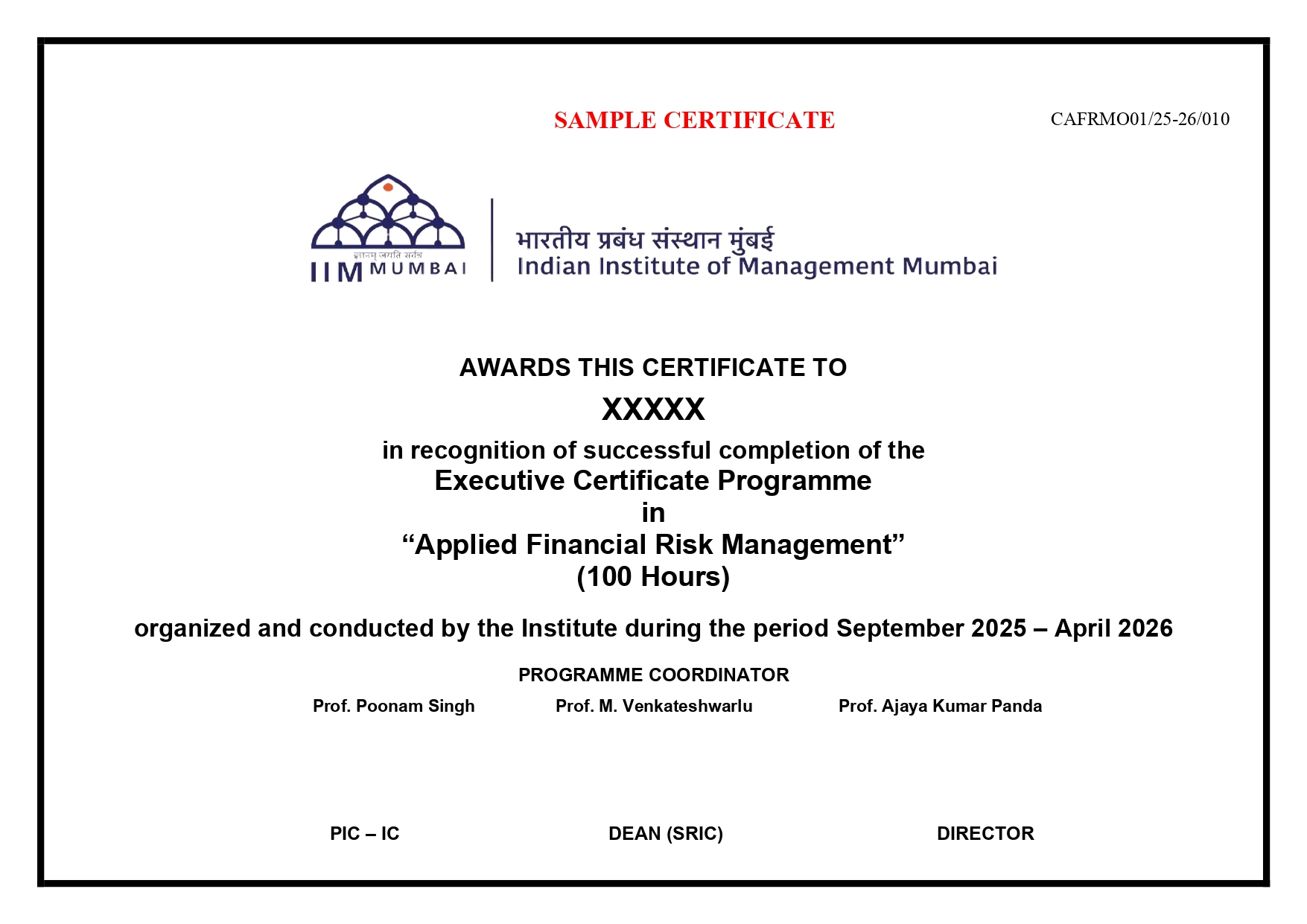


Upon successful completion of the course, you'll receive a prestigious IIM Mumbai certificate, highly valued in the corporate world.

Comprehensive course on financial risk management covering theory, tools, assessment, mitigation, derivatives, and key risk types: credit, market, operational.

Attendees can connect with industry peers, build strong professional networks, and explore meaningful opportunities for collaboration.

IIM Mumbai classes are led by expert faculty with deep knowledge and experience in finance and risk management.

The programme aligns with modern financial risk trends, equipping learners with relevant skills for today’s dynamic business environment.

The programme uses real-world cases to provide practical, hands-on insights into financial risk management in business contexts.
Graduates from a recognized University (UGC/AICTE/DEC/AIU/State Government) or an equivalent diploma holder with minimum 50% marks.
Aspirants with professional experience of 1 years in any domain.
The IIM Mumbai Applied Financial Risk Management course will cost INR 1,60,000/- plus 18% GST. Easy EMI options are available.


Credit Risk Analyst
Risk Manager
Market Risk Analyst
Compliance Officer
Treasury Manager
Financial Risk Analyst
Internal Auditor – Risk & Controls
Finance Manager
Chief Risk Officer (CRO)
Investment Risk Analyst
Aspirants Seeking a Career in Finance Risk Management
This course provides a rigorous introduction to the quantitative techniques used in risk management. It covers statistical modeling, financial mathematics, and computational methods to assess, measure, and mitigate risks in financial markets.
This course aims to provide a comprehensive understanding of derivatives. It explores derivative instruments, such as options, futures, forwards, and swaps, and their roles in hedging, speculation, and arbitrage strategies.
This part of the course will introduce the role and relevance of artificial intelligence in risk management. Also, how Machine Learning techniques and their applications in Investments. Finally, it deals with risk management and interface FinTech and Climate Risk
This course provides a deep dive into the principles and quantitative techniques used to measure, analyze, and mitigate market risk in financial institutions. Participants will explore key risk metrics such as Value-at-Risk (VaR), Expected Shortfall, and stress testing, along with advanced statistical and computational models for risk assessment.
This course equips participants with the knowledge and tools to identify, assess, and mitigate risks in investment portfolios. It covers quantitative techniques for portfolio risk measurement. Participants will learn to apply risk-adjusted performance metrics, diversification strategies, and hedging techniques to optimize investment decision-making.
This course provides a comprehensive understanding of credit risk, its measurement, and management techniques in financial institutions. Participants will explore credit risk assessment models, default probability estimation, credit rating systems, and regulatory frameworks such as Basel III. The course also covers credit derivatives, loan portfolio risk management, and stress testing methodologies to mitigate credit risk exposure.
This course provides a comprehensive understanding of Operational Risk, equipping participants with the knowledge and tools to identify, assess, and mitigate risks that arise from internal processes, people, systems, and external events. Through real-world case studies and practical frameworks, learners will explore risk management strategies, regulatory requirements, and best practices to enhance operational resilience and safeguard organizational performance.
Earning a Financial Risk Management certification from IIM Mumbai opens the door to a host of transformative career benefits. This achievement signifies a major milestone in your professional growth, positioning you for strategic leadership roles and equipping you with the expertise to navigate the complex world of financial risk. The value of this certification goes beyond academics — it accelerates career advancement, sharpens relevant skill sets, enhances earning potential, expands networking opportunities, strengthens leadership capabilities, boosts job security, and drives innovation and digital transformation. It’s more than a credential — it’s a catalyst for long-term success.
After completing the training modules of the IIM Mumbai Executive Certificate Programme in Financial Risk Management, participants will receive an accredited certificate from IIM Mumbai, subject to meeting attendance requirements and submitting a final project for evaluation.

Participants will be advised by professional counselors over the virtual mode
Profiles will be shortlisted in view of qualification standards and counselor comments on the profile.
Profile gets Approved or Rejected based on the shared information.
Only Approved profiles proceed further for enrollment process.
IIM Mumbai, formerly known as NITIE, is one of India’s premier management institutes, established in 1963 by the Government of India with support from the UNDP and ILO. Consistently ranked among the top B-schools in the country, IIM Mumbai secured the 6th position in the 2024 NIRF rankings for Management Institutes. Nestled in the heart of India’s financial capital, the institute benefits from strong industry linkages, offering students rich exposure to real-world business practices. Known as "God's Own Campus," its lush, lake-surrounded environment fosters both academic excellence and holistic development.
With over 60 faculty members and 1200 students, IIM Mumbai offers specialized MBA programs in areas such as Operations, Supply Chain, Sustainability, and more, along with executive education in collaboration with IIT Delhi. Under the leadership of Prof. Manoj K. Tiwari, IIM Mumbai continues to be a hub for innovation, research, and leadership development, especially in Logistics and Supply Chain Management, with global academic collaborations and a strong student exchange network.